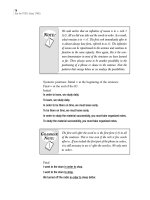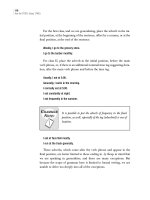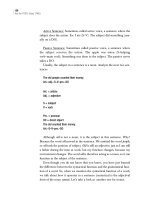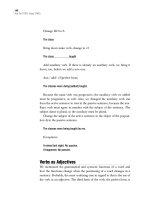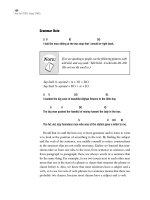Ace the toefl essay part 11
Bạn đang xem bản rút gọn của tài liệu. Xem và tải ngay bản đầy đủ của tài liệu tại đây (159.75 KB, 10 trang )
90
Ace the TOEFL Essay (TWE)
The girl was making candy tomorrow, but now she has decided not to
make it.
Perfect Forms
The perfect forms are usually what most students have problems with
when studying English, even the best students. Because of this, we will
view a timeline to simplify things.
_____Past Perfect_____Simple Past_____Now
Had + verb 3 X Has +
verb_3_____−*
Completed
The past perfect verb consists of the verb
had + the third form of a
verb. To make this clear, we will look at a regular verb (one that takes
-ed
in the simple past tense) and an irregular verb (one that does not take -ed
in the simple past tense).
Hereafter, we will call the be verbs auxiliary verbs when
they accompany other verbs, specifically if they come before
another verb in a sentence. The function of these auxiliary
verbs is to help the main verb, the action verb, form a gram-
matical and therefore logical sentence.
Past Perfect
Always supposes we can put the word before in the sentence.
Had + v3 (third form of verb)
I had walked to the store the day before yesterday.
I had eaten
dinner
before I went to the restaurant.
The verb phrase had walked took place before some time in the simple
past. Here, the simple past was
yesterday.
Similarly, the verb phrase had eaten happened before some time in the
simple past, which was
I went to the restaurant.
In both sentences, the action took place and was completed entirely
THE
:
RE
N
OTE
:
TOEFL Internals flowed 7/13/07 3:36 PM Page 90
91
Parts of Speech
before some time in the past. Be aware that the italicized phrases will be
called time tags when examining sentences in the future. Now, we know
that these actions are already completed. With the present perfect, it is not
so easy to discern exactly when the action was completed. With the per-
fect tenses—and we will look at a third next—the action is completed
before a fixed time; with present perfect, the fixed time is
now.
Present Perfect
Has/Have + v3
I have watched television (until/before).
This indicates that I have watched the television at a time before or
until now. The fixed time in the present perfect is always now.
Future Perfect
Will/Shall + have + v3
I will have watched the movie
by 9:00.
I shall have played basketball by Tuesday.
Shall is British English, used mostly in the United
Kingdom and parts of Asia.
Shall basically means that the
situation is imperative (an order). It is not unacceptable in
the United States, but it is highly uncommon. Hereafter,
British English will be abbreviated as Br.E.
Also, note the time tag at the end of the sentence in the
form of by + noun or a time phrase.
Tip:
Remember: Had always = past tense.
Have/has always = present tense.
Verb Conjugation: Past Tenses
When reference is made to v3, the conjugation is as follows. Regular verbs
are formed by adding
-ed to the base to form the simple past tense. The sim-
ple past, however, has no helping verb in an active sentence (i.e., one in
which the subject does the action). In the past perfect, the same method is
THE
:
RE
N
OTE
:
TOEFL Internals flowed 7/13/07 3:36 PM Page 91
92
Ace the TOEFL Essay (TWE)
used as in the simple past tense, but the auxiliary verb had is situated prior
to the main verb and even prior to the helping verb in a verb phrase with
three words (i.e.,
had been walking). Likewise, the auxiliary had is also used
before irregular verbs that do not take
-ed to form the simple past tense, if
the tense is the perfect (i.e.,
he had lent the boy some money). Most students
make errors with the irregular verbs, because they have not memorized
them. We call these verbs in the perfect tenses third form, or v3. A new
word, at least in appearance, is formed in the irregular verbs by a process
called gradation, or ablaut, wherein the internal vowels change (e.g.,
stuck,
wrote, broke). This third form, as we call it, is even usually different from the
simple past tense, or the preterite. Thus, a new form must be learned by
rote (i.e., practicing again and again). Refer to the irregular verb list.
Exercise 4.2
Directions: Fill in correct form of the verb tense.
1. I______(go) to the store before I saw you yesterday.
2. We will have______(complete) the form by the end of the day.
3. I will have______ (see) you by the time I leave.
4. _____(had, have, has) you eaten before you came?
5. I saw you when you were_____(come) down the hill.
6. Who_____(tell) you that I was here?
7. Before I saw him, he had_____(come) here.
8. If I had (know)_____, I would have arrived earlier.
9. Can you (see)_____if I move?
10. If I were (walk)_____, I would not have my keys in my hand.
11. If I had (see)_____the dog, I would tell you.
12. As you run, I will be _____(run) with you.
13. As most people _____(know) already, we will be (learn)
_____more as time goes by.
14. She (walk)_____yesterday, but I had_____(go) before then.
15. If he is (go)_____to the post office later, _____(give) him this
letter, please.
16. Because they had (break up)_____their companies, the com-
petitors _____(get) most of the profits.
EXERCISE 4.2
TOEFL Internals flowed 7/13/07 3:36 PM Page 92
93
Parts of Speech
17. What I (want)_____to see was the success of all of the stu-
dents.
18. Although I had not (see)_____him, I_____(know) then that he
was in town.
19. Because they were (go)_____ so slowly, the meteor
_____(overtake) them in a matter of seconds.
20. After you (give)_____me the green light, I (send)_____your let-
ter to the boss.
21. What bothers me is that as you are (get up)_____, I will be
(go)_____to bed.
22. Not knowing the truth is what had (give)_____me the problem
before you finally (tell)_____me.
23. I had_____(lend) him money far in advance.
24. Too much responsibility always (cause)_____problems with
irresponsible tenants.
25. Since you will be (arrive) _____early, could I (impose)_____ on
you for a ride?
Exercise 4.3
Directions: Write
C
for
copula verb
or
A
for
action verb
for the
underlined words.
1. He sounded the bell loudly due to the impending storm.
2. He looked tired after being on the road for two days.
3. As we walked through the pyramids, a rainbow appeared over
the horizon.
4. It seemed as if we were lost.
5. He reacted calmly.
6. We remained calm through the night
7. Something smelled fishy about his late-night meetings.
8. He smelled badly, because his nose was broken.
9. I felt bad about having her dog put outside.
10. He appears to know what he is doing.
11. The paper felt rough.
EXERCISE 4.2
EXERCISE 4.3
TOEFL Internals flowed 7/13/07 3:36 PM Page 93
94
Ace the TOEFL Essay (TWE)
12. He looked about the room furtively.
13. He acted tough.
14. He acted very obnoxiously at dinner.
15. We wanted to ensure that the room did not smell bad.
16. He was acting like a security guard.
17. They remained in the ambulance.
18. The excuse sounded like a lie.
Modal Verbs
Can, could, may, might, shall, should, will, would, must, ought to, need,
and dare.
Rule: Syntactically (in a sentence), the very first verb following the
modal must always be the base form, uninflected, what we refer to as ver-
bal, even if it is an auxiliary verb.
Functions
Modals express mood: indicative, subjunctive, and imperative.
Indicative
—objective fact
Imperative
—command, order, obligation
Subjunctive
—expresses a contingent or hypothetical action
Although we say that some of these verbs are the past tense of other
forms, they do not necessarily function in that manner. Let’s define them;
then we will rank them.
Expression Modal Example
Future will I will eat less.
Ability can/could I can go home. I could go
home if . . .
Ability (past) could I could swim when I was eight.
Necessity must/have I must protect my children.
I have to work.
EXERCISE 4.3
TOEFL Internals flowed 7/13/07 3:36 PM Page 94
